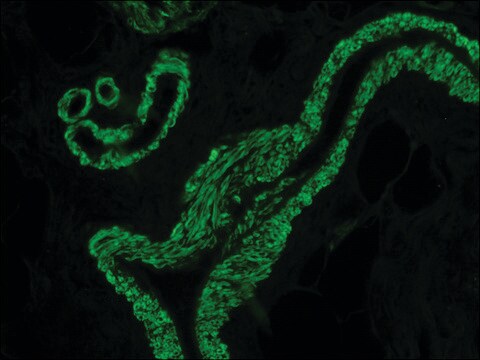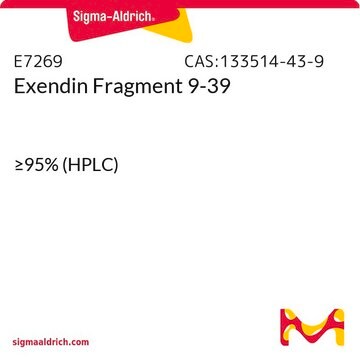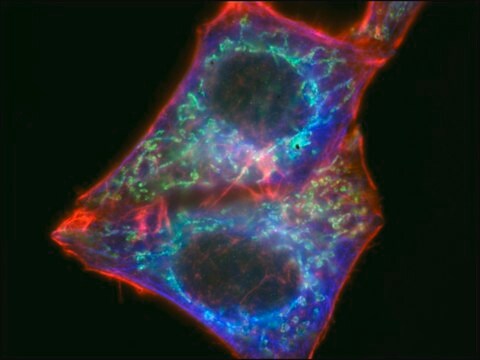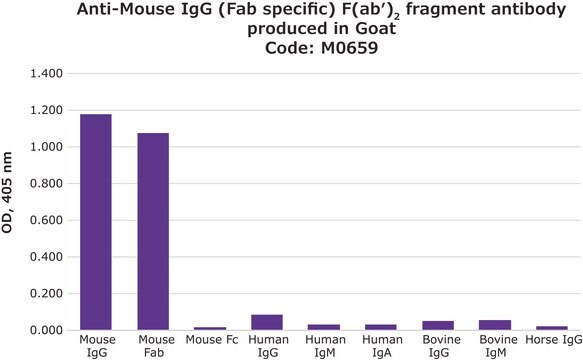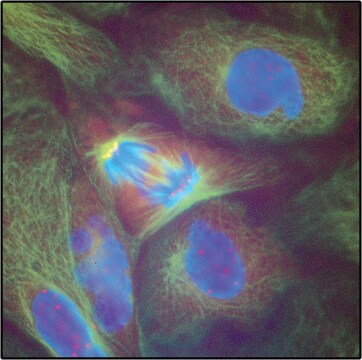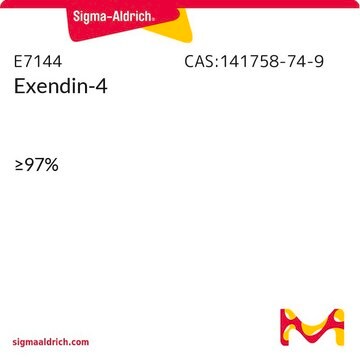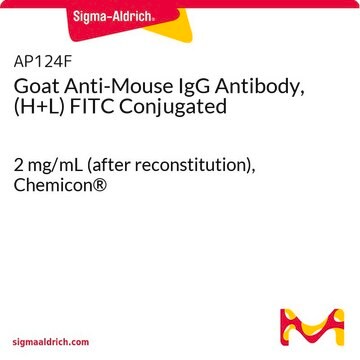추천 제품
생물학적 소스
goat
Quality Level
결합
FITC conjugate
항체 형태
affinity isolated antibody
항체 생산 유형
secondary antibodies
Grade
flow cytometry grade
클론
polyclonal
양식
buffered aqueous solution
저장 조건
protect from light
기술
flow cytometry: 1:100
immunohistochemistry (formalin-fixed, paraffin-embedded sections): 1:160
저장 온도
−20°C
타겟 번역 후 변형
unmodified
유사한 제품을 찾으십니까? 방문 제품 비교 안내
일반 설명
IgG antibody subtype is the most abundant serum immunoglobulins of the immune system. It is secreted by B cells and is found in blood and extracellular fluids.
Fluorescein isothiocyanate (FITC) is a fluorescein derivative (fluorochrome) used to tag antibodies, including secondary antibodies, for use in fluorescence-based assays and procedures. FITC excites at 495 nm and emits at 521 nm.
Fluorescein isothiocyanate (FITC) is a fluorescein derivative (fluorochrome) used to tag antibodies, including secondary antibodies, for use in fluorescence-based assays and procedures. FITC excites at 495 nm and emits at 521 nm.
Mouse IgG is a plasma B cell derived antibody isotype defined by its heavy chain. IgG is the most abundant antibody isotype found in mouse serum. IgG crosses the placental barrier, is a complement activator and binds to the Fc-receptors on phagocytic cells. The level of IgG may vary with the status of disease or infection.
Anti-mouse IgG is conjugated to Fluorescein Isothiocyanate (FITC), Isomer I. The F(ab′)2 antibodies isolated from goat antiserum by affinity chromatography, react specifically with mouse IgG Fc; does not bind other mouse Igs. No cross reaction is observed with mouse Fab fragment. The antibody shows minimal cross reaction with human, horse and bovine proteins on tissue or cell preparations.
Anti-mouse IgG is conjugated to Fluorescein Isothiocyanate (FITC), Isomer I. The F(ab′)2 antibodies isolated from goat antiserum by affinity chromatography, react specifically with mouse IgG Fc; does not bind other mouse Igs. No cross reaction is observed with mouse Fab fragment. The antibody shows minimal cross reaction with human, horse and bovine proteins on tissue or cell preparations.
특이성
Goat polyclonal anti-Mouse IgG (Fc specific) F(ab′)2 fragment−FITC antibody isolated from goat antiserum by affinity chromatography reacts specifically with mouse Fc fragment. No cross reaction is observed with mouse Fab fragment. The antibodies are adsorbed to assure minimal cross reaction with human, horse and bovine proteins on tissue or cell preparations.
면역원
Purified Fc fragments of mouse IgG
애플리케이션
Anti-Mouse IgG (Fc specific) F(ab′)2 fragment-FITC antibody produced in goat has been used in :
- flow cytometry for labelling of human peripheral blood lymphocytes (dilution of 1:100) and label human polymorphonuclear cells (PMNs) (dilution of 1:50).
- immunocytochemistry using human embryonic stem cells
- immunohistochemistry at a working dilution of 1:160.
Goat polyclonal anti-Mouse IgG (Fc specific) F(ab′)2 fragment-FITC antibody may be used as a reagent in flow cytometry, immunohistology and immunocytology offering sensitive and specific activity to mouse IgG and no cross reactivity with human, horse or bovine immunoglobulins.
Immunohistology: A minimum dilution of 1:160 is determined by indirect immunofluorescence on formalinfixed, and paraffin-embedded human tonsil using mouse monoclonal anti-human IgG as the primary antibody.
Immunohistology: A minimum dilution of 1:160 is determined by indirect immunofluorescence on formalinfixed, and paraffin-embedded human tonsil using mouse monoclonal anti-human IgG as the primary antibody.
생화학적/생리학적 작용
immunoglobulin G (IgG) antibody provides protection from infections caused by bacteria, fungi and viruses. Maternal IgG is transferred to fetus through the placenta that is vital for immune defence of the neonate against infections. IgG antibody participates in complement fixation and opsonization.
기타 정보
Antibody adsorbed with bovine, equine and human serum proteins.
물리적 형태
Solution in 0.01 M phosphate buffered saline, pH 7.4, containing 1% bovine serum albumin and 15 mM sodium azide.
제조 메모
Adsorbed to reduce background with bovine, horse or human samples.
Useful when trying to avoid background staining due to the presence of Fc receptors.
Useful when trying to avoid background staining due to the presence of Fc receptors.
면책조항
Unless otherwise stated in our catalog or other company documentation accompanying the product(s), our products are intended for research use only and are not to be used for any other purpose, which includes but is not limited to, unauthorized commercial uses, in vitro diagnostic uses, ex vivo or in vivo therapeutic uses or any type of consumption or application to humans or animals.
적합한 제품을 찾을 수 없으신가요?
당사의 제품 선택기 도구.을(를) 시도해 보세요.
Storage Class Code
10 - Combustible liquids
WGK
nwg
Flash Point (°F)
Not applicable
Flash Point (°C)
Not applicable
개인 보호 장비
Eyeshields, Gloves, multi-purpose combination respirator cartridge (US)
가장 최신 버전 중 하나를 선택하세요:
시험 성적서(COA)
Lot/Batch Number
Pernille B Jørgensen et al.
PloS one, 7(9), e46120-e46120 (2012-10-11)
Multiple sclerosis (MS) is associated with Epstein-Barr virus (EBV) infection, but impaired immune suppression may be part of the disease pathogenesis. CD8(+) T cells that are restricted by HLA-E exert an important immunoregulatory mechanism. To explore how EBV might interfere
Ana Cecilia Machado Diaz et al.
Arthritis, 2012, 943156-943156 (2012-08-14)
Rheumatoid arthritis (RA) is an autoimmune and inflammatory disease in which many cytokines have been implicated. In particular, IL-15 is a cytokine involved in the inflammatory processes and bone loss. The aim of this study was to investigate the existence
Thomas Hills et al.
PloS one, 11(11), e0166383-e0166383 (2016-11-20)
The need for CD4+ T cell responses to arise de novo following vaccination can limit the speed of B cell responses. Populations of pre-existing vaccine-induced or anti-viral CD4+ T cells recognising distinct antigens could be exploited to overcome this limitation.
Mami Nakahara et al.
Endocrinology, 153(4), 2034-2042 (2012-02-16)
We have recently shown that wild type mice are highly tolerant, whereas thyrotropin receptor (TSHR) knockout (KO) mice are susceptible to immunization with the mouse TSHR, the autoantigen in Graves' disease. However, because TSHR KO mice lack the endogenous TSHR
Raheem Peerani et al.
Methods in molecular biology (Clifton, N.J.), 482, 21-33 (2008-12-18)
Local micro-environmental cues consisting of soluble cytokines, extra-cellular matrix (ECM), and cell-cell contacts are determining factors in stem cell fate. These extrinsic cues form a 'niche' that governs a stem cell's decision to either self-renew or differentiate into one or
자사의 과학자팀은 생명 과학, 재료 과학, 화학 합성, 크로마토그래피, 분석 및 기타 많은 영역을 포함한 모든 과학 분야에 경험이 있습니다..
고객지원팀으로 연락바랍니다.